How ‘The Office’ Uses Characters and Comedy to Impart Life Lessons
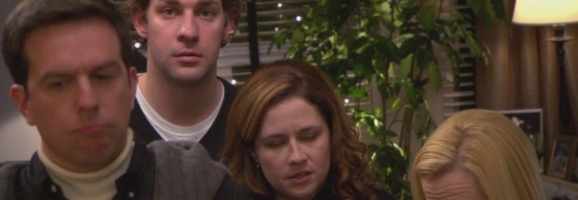
Nowadays, there are many ways to try and impart life lessons to society, whether it is through the form of novels, music, or movies. The most popular mode in which we seem to learn life’s lessons is through television, and more specifically television series. We see this in shows like “How I Met Your Mother” and “Modern Family,” where life lessons such as honoring individuality and respecting others come into play.
Of the numerous television series out there today, one that has made a mark is the American version of “The Office.” The show shadows the quirky office workers of Dunder-Mifflin, a fictional paper distributor in Scranton, Pennsylvania. One-on-one discussions with the workers, rougher footage, and humorously bizarre yet relatable plots have made this series enormously popular. Steve Carrel, among many other talented actors and actresses, portrays life’s most awkward situations not only to make his audience laugh, but to also deliver small dosages of life lessons. With that being said, I have chosen to analyze an episode from season four of “The Office,” the unforgettable “Dinner Party.”
The narrative within this episode chronicles a disastrous dinner party at Michael Scott’s house, in which Michael’s employees Pam, Jim, Andy, and Angela are suckered into attending. Without a doubt, plenty of awkward situations arise, accompanied by numerous “laugh out loud” moments. Clearly the objective here is to impart life lessons through the use of comedic situations. However, does the narrative within this episode effectively fulfill its objective?
Proof through Narrative Criticism
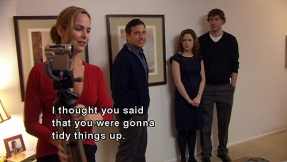
I will prove that this specific episode does, indeed, fulfill its objective by identifying features of the show’s narrative, and evaluating the narrative in relation to its objective.
If the four key characteristics of a narrative can be found within an artifact, then it can indeed be considered a narrative. The first of these characteristics is that two events must have taken place; these events can either be stative—”expressing a state or condition”—or active—”expressing action” (Foss, 2009, p. 307). In order to be a narrative, the events must also have a sequence, whether it is in logical time order or through the use of flashbacks. The narrative must have a contributing relationship with the events detailed as well; essentially, a change must be experienced during the story. The final characteristic that must be present is that the story must center on one “unified subject” (Foss, 2009, p. 308). This specific has includes all of these narrative elements, so it qualifies as good artifact for narrative criticism.
It is evident that this episode of “The Office” effectively fulfills its objective, which is to, for all intents and purposes, offer life lessons. The specific life lessons that I believe this episode strives to teach are 1) Don’t force something to work if it clearly isn’t working, and 2) Don’t change yourself to meet expectations that you don’t feel comfortable meeting. I believe that this episode effectively teaches these lessons with the use of a three particular narrative features, the first being the episode’s use of narration, the second being its characters, and the third being the episode’s type of narrative—comedy.
Narration

In the series, there is not one designated narrator. Instead, the episode is chronicled by a multitude of different characters, usually through their one-on-one discussions. This episode is no exception, and it actually works to the show’s advantage, especially in terms of fulfilling the narrative’s objective. Since there isn’t one specific narrator intruding on the plot, audience members are able to instead focus on what each character has to say or how they feel about a particular situation they’re in. In a very subtle way, doing this points out the two life lessons that the episode is out to teach.
For examples of this, we need not look farther than the commentary of the characters. Michael is not the typical detatched boss, but rather one who desperately tries to being close friends with his employees. We find out through one-on-one discussions that Michael has attempted to invite everyone over to his place for dinner at least nine other times. It is clear that this is something that really bothers his employees; through body language and vocal cues alone, the characters show just how uncomfortable they are with Michael’s advances.
Even in scenes later in the episode, like when Pam confesses that she just wants to eat so she can high-tail in out of there, we note the discomfort and aggitation. Michael’s way of trying to forge unwanted friendships through his horrendously long and drawn-out dinner party is, quite frankly, working against him. It is in these little revealing narrations where the concept of not forcing something that isn’t working becomes subtly evident.
Characters
The writers of the series have developed a wide range of unique characters over the course of the series; these flat and round characters work together in each episode to create situations that work to teach some sort of lesson, and this episode is no exception.
Two specific characters work within this episode to create situations that in turn teach the audience some valuable lessons—Michael, a round character with wild and unpredictable behavior, and Jan, a flat character who is relatively dry and predicable. Due to their conflicting personalities, they cause many awkward situations to relate back to the two life lessons previously mentioned.
One example of this is when Michael brings up the fact that he had three vasectomies to appease and meet the expectations set by his girlfriend Jan. This relates especially to the principle of not changing yourself to meet the expectations that you don’t feel comfortable with. Michael himself states that Jan doesn’t know the “emotional toll that three vasectomies has on a person” (Daniels, 2008), which presents the lesson to the audience.
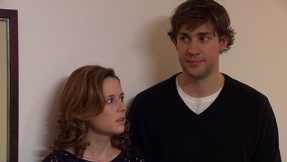
Another example is when Michael and Jan give Pam and Jim a tour of their place. When they get to their bedroom, Michael shows them how he sleeps on the tiny bench at the end of the bed because Jan has “some space issues.” Even though Michael jokes about it, audience members can sense that he is actually very uncomfortable with the situation. Again, this relates back to the idea of not changing yourself (or in this case, what you do) to meet other people’s expectations.
Romantic character relationships isn’t the only place where viewers see these life lessons; acquaintance-ships also help get across these lessons. One acquaintance-ship notorious in the series exists between Michael and Dwight. Dwight is always trying to get in Michael’s good graces. Michael, on the other hand, isn’t always a huge fan of Dwight. When it comes to inviting people to his dinner party, he intentionally doesn’t invite Dwight, reasoning that it’s for “couples only” and that he doesn’t have enough wine glasses. Clearly, their acquaintance-ship is not entirely desirable on Michael’s end. However, Dwight forces their relationship to work by showing up to the party with a date and extra wine glasses. The end result of annoyance and discomfort felt by Michael proves that one shouldn’t force something that isn’t working out.
Comedy
Another narrative feature that lends to fulfilling this episode’s objective is the type of narrative, which in this case is comedy. Serious television series can certainly impart life lessons in an effective way, but comedic television series seem to do so in a more natural and satisfying way. “The Office” is known for its comedy and hilarious one-liners, and the comedy within this episode helps to deliver the two life lessons mentioned before in memorable ways.
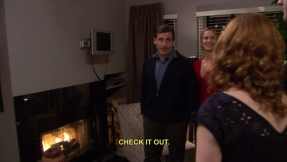
For example, later in the episode, Michael and Jan get into a fight that basically revolves around problems in their relationship (which relates to the lesson of not forcing something that clearly is working out); during this fight Michael yells out the famous phrase “that’s what she said” and Jan throws a trophy at Michael’s beloved plasma screen TV, two actions that are not only hilarious, but unforgettable (Daniels, 2008). Because these actions are unforgettable, the audience is able to remember the fight between the two characters, why the fight took place, and the lesson that it is trying to make evident.
Even early on in the episode, viewers can tell that tell that Michael and Jan’s relationship is strained through some funny snarky comments. When Pam admits that Jim couldn’t set up her TiVo, Jim tells her that if she ever needs help, he’s only a phone call away. To that, Jan gives Michael the stink eye, hilariously adding “I bet you are.” Obviously, Michael is in a relationship that is dominated by demands and expectations that are incredibly ridiculous to uphold. The whole situation reminds viewers, again, that if something is working (Michael and Jan’s complicated relationship, in this case), it is better to break it off instead of uncomfortably trying to force things to work.
Audiences can extract life lessons through seemingly minor comedic scenes, too. At the very end of the episode, viewers see Angela and Andy in Andy’s car after that train-wreck of a dinner party. First-time watchers, and religious watchers as well, already sense the tension between the couple. In attempts to lighten the mood, Andy tries to flirt with Angela by taking a bite of her ice cream cone. In response, Angela reaches out the window and crushes the ice cream into the side of Andy’s car. These actions reinforce the idea of not forcing something that clearly isn’t working.
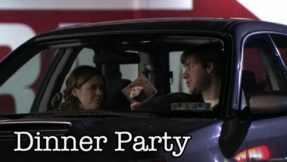
Overall, “The Office” has been excellent when it comes to subtly (and maybe even not-so-subtly) slipping in these little life lessons. Take a look at any episode, and you’re sure to find wisdom being imparted in some way. The one-on-one conversations with each character throughout the each episode also contain pockets of wisdom and life lessons for the audience to absorb. It is interesting, still, that a bulk of these lessons can be learned through the actions of the characters, too. Just a simple “That’s What She Said” joke and the reactions that it sparks can be so telling in imparting life’s little lessons.
Let’s face it, whether you’re laughing or crying at this show, you’re learning something. Isn’t that fantastic?
Works Cited
Foss, S. K. (2009). Rhetorical criticism: Exploration and practice, 4th ed. Long Grove, IL: Waveland Press, Inc.
Daniels, G. (Writer), & Einhorn, R. (Director). (April 8, 2010). Dinner Party [The Office]. In G. Daniels (Producer). Los Angeles, California: NBC.
What do you think? Leave a comment.











Good Article.
Watching this episode, I felt very claustrophobic, maybe because there we so many people in such a small condo, and because the tension in the air made it seem even more uncomfortable. If that’s what they were going for, it worked — on me at least.
Although I do enjoy the character development aspects of latter-day Office episodes, I really miss the joke-after-joke episodes of earlier seasons. I saw the “Sexual Harassment” episode recently, and it seems like the jokes were more plentiful in previous seasons. The story lines also used to be based a lot more on things that happen at an actual office, which made the show easier to relate to.
The Office feels more like a relationship comedy, which is okay I guess, but there’s SO MANY relationship comedies out there already. I think in trading office jokes for relationship humor, it’s lost a little bit of its comedic punch. I still enjoy watching it.
This was a great episode.
My only problem with the episode: What is up with Kelly and Darryl not being included in the couples dinner? I demand Darryl be in every episode.
Darryl works in the warehouse so he wouldn’t have been tricked by Michael’s “work late” scheme. Also, he probably would’ve found a way out of it. I would’ve loved for him to be there too though.
Really really love that you did such an indepth analysis of an episode of The Office. I will say that these life lessons at the end of sitcoms now-a-days have become somewhat trite in my opinion. They no longer seem particularly sincere since they aren’t much more than a “fill in the blank moment” in a very structured sitcom plot. You always hear the music start playing at the end of a Modern Family episode and expect some sort of voiceover telling you what you should learn from the earlier happenings. However, I think that the post commercial snipit at the end of all these sitcoms actually redeems things, leaving us usually with a chuckle, and (hopefully) providing a bit of originality.
I remember this being a solid episode.
Very uncomfortable with lots of laugh-out-loud lines and moments, but I kinda yearn for more episodes in the office with no party going on.
The Office is absolutely my favorite show of all time. Not only because it is beyond hilarious in its own unique ways, but because the characters are so and the scenarios are always realistic and even applicable to real life. Love, love, love.
Interesting article about one of my favorite sit-coms. I would also argue that a lesson from this episode is to not treat others as objectives to a selfish end. Most noticably, the entire dinner party is a front to alleviate Michael and Jan’s pain coming from another night alone with each other, at the party-goers’ obvious expense.
Also, most of the painfully funny moments: Dwight’s intrusion, Jim and Pam throwing each other under the bus to get away, Jan’s snipes at Michael’s insolence, Michael lording over his stuff and by extension his financial power over Jan, Angela’s…I don’t know where to begin with her. Andy garners the most sympathy by being the only one to care about having a good time.
I might have to re-watch the series to see if this moral thread encompasses the whole series or just this episode. Or maybe I just described all of comedy and I’m taking this too far.
The best part about this show is how relatable it is. Great analysis of an episode and good argument!
Amazing analysis of a TV show! While I am an Office fan, I found it hard to get into at first mostly because of the second-hand embarrassment. However, the more I watched the more I got into it. I didn’t realize when I was watching it, but damn, you are right. The Office did teach me life lessons. I think you are dead on with the comedy being a vehicle for the show to deliver its message, in my opinion though, the characters are the best vehicles for this. While many of the characters (Stanley I’m looking at you), aren’t as well fleshed-out as my obsession would like, I think each character lends an important narrative to the story. I understand when you say that some characters are round and some are flat, but in my opinion, it does a wee bit of a disservice to the so-called “flat” characters. Each character has flaws and quirks, just like everyone ever, however the morals and values of each character are clear in many of the episodes, even if they’re only on screen for a bit. To me, these characters and how they reacted to situations taught me more about life then the other narratives you mentioned.
All truths.. And the Dinner Party episode was pretty much the most awkward of all.
Very interesting. I had not considered “The Office” in that light before. Well done!
I thought the episode was one of the best of season 4.
I had always viewed “The Office” as humorously pointing out the awkward situations of modern life. Your analysis got me to view it in a new way, as actually imparting life-lessons. Thanks for the analysis.
It was interesting to see someone pull deeper meanings out of a show such as “The Office”. This was certainly an analysis that I’ve never read before.
The only point of advice I would make to you is re-reading your finished article to work out the grammatical kinks and spelling errors before publishing.
I enjoy the way this show provided life lessons without it having to be forced upon us, pushed with force like in conventional sitcoms. No loving music, no ‘I learned something today’. I really enjoyed this episode, as well as the article!
Do we learn lessons from the office? yes. But I feel like that’s true of any conventional sitcom. weather it’s heavy handed or not I think, has to do with what the writers think will or won’t work as a mechanism of delivery. I think the office writers are counting on you to feel they’re sophisticated and therefore accept the lesson they’re pushing.
I found it hilarious they used the bathroom in the episode as a chance to capture Jim and Pam’s perspective on the night a la “talking head” shots. A little weird to think the documentary film crew was hanging out in the bathroom with them, though!
Solid look at a great series and brilliant episode. Dwight’s description of his “relationship” with his former babysitter as “purely carnal” was master class writing.
Such a great show-this was the first comedy series I got into. There were many subtle life lessons throughout the series, and I love how you unpacked them in this article.
I really think you picked a great topic for analysis, and I think your review was nicely in depth. However, I am a little disappointed because I did not find your main point quite so interesting. I am most certainly a hypocrite in saying this, but often the better argument is one that is or at least seems to be contested. I think your article is at its most interesting when it discusses comedy specifically as a mode of providing morals. I think an article more focused on what makes comedy work would have been better because I think that would be a more interesting thing to prove (whereas it goes without saying that characters are a vehicle for morals). That said, I really enjoyed the time you spent discussing comedy specifically, and I hope you consider doing an article that expands the ideas you brush on here.
I have to admit, my partner and I do not watch much T.V. (we don’t have cable, dish, etc.), and we rarely watch movies. We might watch a movie once every two or three months. However, we have a little TV monitor that we can watch DVDs on. And with that little television, we watch re-runs of “The Office”(my sweet brother let us borrow all the seasons). When we don’t have public radio or music playing in the background, we have “The Office” on as our background noise. There is something we find endearing about that show and the characters. Like most, we live very busy lives with stressful careers, so we joke that “The Office” is our little break from reality. We find the type of humor quite amusing and often sarcastic (which we both appreciate). With all of that said, your title caught my attention. I have never thought of this show as being educational in relation to learning life lessons. However, as I read, I began thinking back to the “dinner party” episode as well as others, and realized that life lessons can be taken out of this entertaining and hilarious comedy. I look forward to discussing your essay with my partner tonight, and will challenge both of us to look for the life lessons next time we watch this beloved comedy. Thank you for your insightful input; this was an enjoyable read.
I agree with your points and think that The Office did a terrific job of sending messages and getting their main points across to the audience. The idea of comedy being used to do so would not be one most would think of, but, as you said, it works quite well. Remembering the ridiculousness of the dinner party that Michael throws is something that I even remember, even though I have not seen the episode in years. Sometimes being the opposite of subtle is what it takes to send a message that will be remembered not only right after but for years to come.